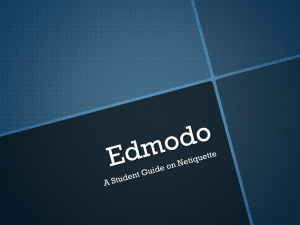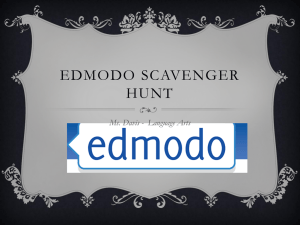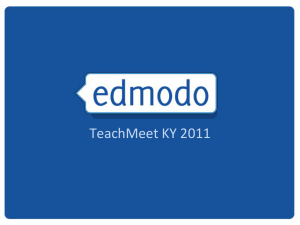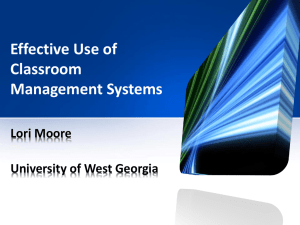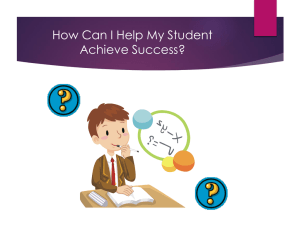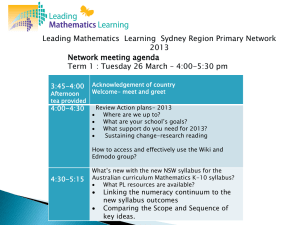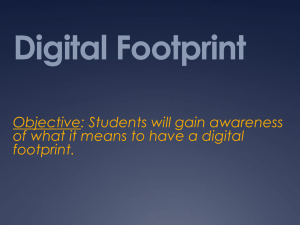RRVWP PowerPoint Presentation
advertisement
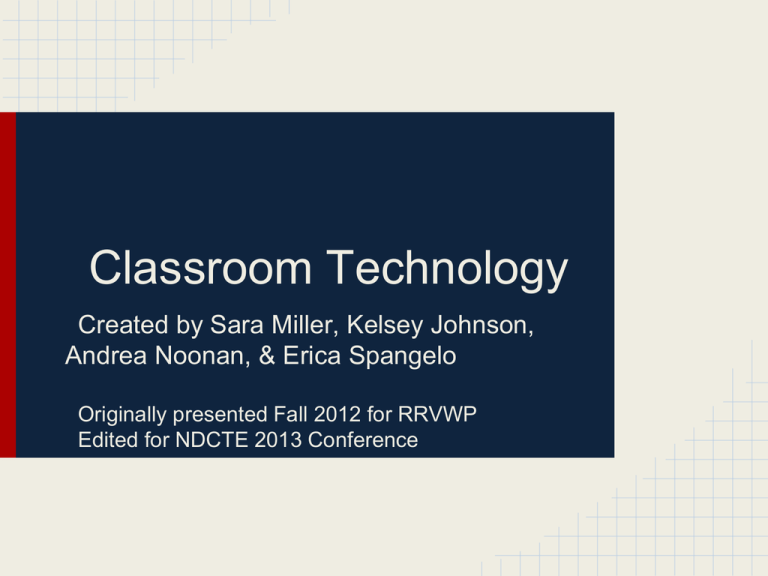
Classroom Technology Created by Sara Miller, Kelsey Johnson, Andrea Noonan, & Erica Spangelo Originally presented Fall 2012 for RRVWP Edited for NDCTE 2013 Conference Classroom Writing Technology Because "technology" is an extremely, broad term, we started with a group question and then proceeded to ask individual questions focused on our comfort level and interests. Our group question was the following: "What are best practices for using technology in order to reach goals?" Kelsey's Research Using Edmodo in the secondary classroom Question and Hypothesis Group Umbrella Question: What are best practices for using technology in order to reach goals? My Question: Will blogging or using social media like Edmodo help foster a stronger classroom community? My Hypothesis: I believe students will be motivated to use technology like Edmodo to collaborate and foster a stronger community because it's approachable technology that students already use in daily life. Research/Texts Used Allison, Paul. "Be A Blogger: Social Networking in the Classroom." Teaching the New Writing: Technology, Change, and Assessment in the 21st-Century Classroom. Ed. Anne Herrington, Kevin Hodgson, and Charles Moran. New York: Teachers College, 2009. 75-91. Print. - See included annotated bibliography excerpt Doe, Charles. "Writing Software And Webware In The Age Of Social Computing." Multimedia & Internet@Schools 14.4 (2007): 17-20. Academic Search Premier. 20 Sept. 2012. Web. 20 Sept. 2012. - See included annotated bibliography excerpt http://blog.simplek12.com/social-media/tweeting-with-students-uncharted-territory/ http://www.edutopia.org/how-to-blog Allison, Paul. "Be A Blogger: Social Networking in the Classroom." Teaching the New Writing: Technology, Change, and Assessment in the 21st-Century Classroom. Ed. Anne Herrington, Kevin Hodgson, and Charles Moran. New York: Teachers College, 2009. 75-91. Print. • Allison uses this chapter in the book to paint a picture of what blogging looks like in his classroom. He uses a student, Nichole, as an example and tells us what she does for a week in his class: free-writes, comments on others’ blogs, revises, finds Creative Commons images, polishes, links, and, finally, posts her blog. His classroom is specifically setup for blogging and “teaching new writing” so he has more freedom and time to incorporate blogging into his classroom. Allison goes on to state that with blogging students are able to have a more authentic audience causing students to be more cognizant and polished publishers. He provides a matrix for students to navigate on their own in his very student-centered “studio classroom environment.” Doe, Charles. "Writing Software And Webware In The Age Of Social Computing." Multimedia & Internet@Schools 14.4 (2007): 17-20. Academic Search Premier. 20 Sept. 2012. Web. 20 Sept. 2012. • In this article, a reader is informed on numerous types of blogs, wikis, and intervention websites and web 2.0 tools. The author provides a quick analysis and review of the nine web tools discussed in the article. Besides giving the reader a list of tools to help student succeed, the author also discusses the importance of incorporating such technologies of blogs and wikis. He argues that students are intrinsically motivated to write more informally because of social networking like Facebook and MySpace. When students see teachers latching on to the technology they use, they are more apt to realize the importance of grammar and vocabulary acquisition. Background Information - I teach 8th graders, Juniors, and Seniors in a small, rural school (LaMoure) with about 100 7-12 graders. - general English classes plus electives - English 8 is 14 kids (more girls than boys) - all students have iPads - English 11 is 22 kids (16 boys, 6 girls) - Speech is 4 kids (1 boy, 3 girls) - Creative Writing is 6 girls - Brit Lit is 11 kids (even split, basically) - upperclassmen have access to school laptops and computer labs; cannot use cell phones or iPods How It Really Worked I thought, "Kids love technology. They're on it all the time. They'll love this." My research kept telling me, "Kids love technology. They'll be intrinsically motivated by technology in the classroom." My kids had differing opinions. Method: I had all of my students in all classes create an Edmodo account and join my classes. The students were allowed to "play" on it to get used to it (basically, a dumbed-down version of Facebook). Edmodo Screen Shots Edmodo Screen Shots • This is an example of an assignment I posted with a weblink. I asked students to look at the webquest thing and then post directly to the assignment to create a dialogue about what they saw. This was done as homework so I could view it before class and use it to guide my teaching the following day. Edmodo Screen Shots • These are a few different types of posts I did to Brit Lit: o Bold posts are called “Alerts” and (most) students have Edmodo linked to their smartphone or text messages so they immediately get these o Regular typeface are “Notes” – just a regular post. Notice that I can link word documents (and all sorts of file types) Edmodo Screen Shots • You can store items in the “library” to retrieve later. Or, they stay there for the next time you teach the class. Then, you don’t have to reupload them. NEW* Edmodo now connects to your Google Drive (Google Docs) to make it even handier! Edmodo Screen Shots • • You can create assignment due dates and reminders for students. o Mine are color coded by class o Students can also upload their assignments directly to Edmodo* (more next) I believe students can also keep their own planner within Edmodo, but I’m not positive. Edmodo Screen Shots • • • This is what an uploaded assignment would look like. Edmodo makes it easy to see who’s turned in and who hasn’t. You can even grade right in Edmodo and make comments on their files! Those blue bars don’t really show up. For privacy reasons, I had to block out my students’ names! Comments from students From informal questionnaires passed about our class' use of Edmodo (which happened in September). Some responses were about the use of Edmodo in our school (many teachers use it) and technology as a whole. "[Edmodo was helpful] because if we need something (like study guides) you can post it." "[Silent Debate] was good but we weren't all on at the same time so that took the debate sense out of it." " "We have 24/7 access to teacher or classmates if needed." (This was a positive and negative.) "Just use it IN class more." "It's glitchy." "It's great for reminders." (common point) "It's hard to type" (from my iPad users with no keyboards) "It keeps record [of our "silent debate"] to study later for our essays." "I usually don't remember whats due for class, and it's helpful to have that posted so I know what to do." "I liked [silent debates] because it was different and interesting to do something new." "I would like it if we didn't use it at all." "I feel more shy on Edmodo because what I say is permanent, where if I say things out loud it's not." "In other classes, I've been assigned homework over the weekends that they didn't talk about in class... which is lame.." Lessons Learned - Kids will use technology if they are given proper guidance in how to use it. Many will not "problem solve" or "figure it out" like we often assume with this generation. - Hypothesis: It's for school, not for fun. - Kids feel like school is being extended beyond the 3:25 bell. Weekends should be for winding down, not more work. - Many students felt Edmodo allowed 24/7 access between teachers and students. - If Edmodo is used in the class during class time, students were more susceptible to using it willingly with a positive attitude. - Many students enjoyed our "silent debates" in English 8 and Brit Lit. Students can access these any time in order to study material for assessments. - As for my specific hypothesis of making us a stronger classroom community - I'm still up in the air. It feels better in English 8, Brit Lit, and CW than last year, but there are too many variables to say "Edmodo did it." - Changes in the future: more direct instruction/expectations for "debates," have something (like a bonus point question) posted every few days to encourage kids to use it more often. 8th graders use it more often because it's in their palms because of iPads. Suggestions for Use • • • • • • • Silent debating Uploading homework assignments Keeping an online lesson planner for students to see Bell ringer work where kids could get a question or problem and respond to it as class is beginning Sharing resources o In English 8 and Brit Lit, we would share websites we thought would be helpful for others during their research if we stumbled upon something. Keeping in contact with parents (they can “join” the class with a specific log-in code) Your ideas? Does anyone use Edmodo currently? Conclusion • • Throughout the 2012-13 school year, I’ve really liked using Edmodo. I don’t use all of the features, but it’s nice for reminders for students. o I mostly use Google Docs for homework being turned in and commenting that way. I believe students are more apt to ask questions with Edmodo. I would see 8th graders, Brit Lit, and Creative Writers really using Edmodo the most (they are my more driven groups of kids) to get clarification on assignments or directly ask me a question outside of school. o I saw less “I didn’t know the assignment” or “I forgot” from my students that embraced the technology.
